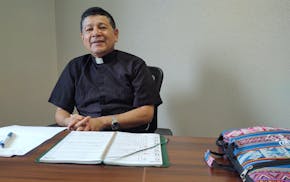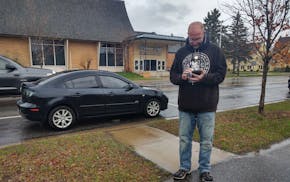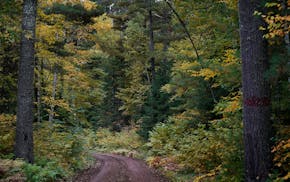FERGUS FALLS, Minn. – Jerry Gale of Brooklyn Park stood in a Fergus Falls church on a recent fall day, telling a small group of Christians about a national movement to install Christians in power at all levels of society.
Called Christian nationalism, it's neither Christian nor patriotic. It's a powerful, focused ideology made up of 1 in 10 Americans that was created to spread the mistaken belief that the U.S. was founded as a Christian nation and that Christians need to take their country back in order to do God's will. Christian nationalism seeks to fuse two identities, that of a Christian with that of an American.
"There's a lot of talk about Christian nationalism being a threat to democracy," Gale told his listeners who came from a variety of faith backgrounds. "It is also a threat to Christianity because it takes a central message of love and service, and turns it into a false idol of power and male domination."
Gale first became aware of Christian nationalism on Jan. 6, 2021, after seeing footage of Christian symbols being carried by those who broke into the U.S. Capitol. He learned all he could about it. Last winter, he founded the Minnesota chapter of Christians Against Christian Nationalism and is trying to spread the word throughout the state.
During his talk in Fergus Falls, he pointed out some of the central leaders of Christian nationalism, such as Ché Ahn, leader of Harvest International Ministry, with 25,000 churches in 65 countries. The week of the Jan. 6 Capitol riot, Ahn said this: "I believe that this week we're going to throw Jezebel out and Jehu's gonna rise up, and we're gonna rule and reign through President Trump and under the lordship of Jesus Christ."
There's Lance Wallnau, a Dallas televangelist who conjured up the Seven Mountain Mandate, has claimed that Vice President Kamala Harris is under the influence of demons and uses witchcraft to look presidential.
Liberal women leaders seem to be a favorite target for Christian nationalists, who denigrate anyone who doesn't conform to their biblical worldview, especially Democrats. Tulsa preacher Jackson Lahmeyer has called former U.S. House Speaker Nancy Pelosi a demon.
The women gathered in Fergus Falls expressed shock at the literal demonization of powerful women.
"This is like a witch hunt!" exclaimed one. "It's like 1692."
"It's worse than I thought," another woman said.
It would be easy to write Christian nationalism off as a fringe movement. But it has been gaining power for decades, driven initially by opposition to the Depression-era New Deal and aided by mega-wealthy donors like the Green family, which owns Hobby Lobby, and fracking billionaires Dan and Farris Wilks, according to the 2020 book "The Power Worshippers" by Katherine Stewart. On Jan. 6, 2021, some carried crosses and religious imagery as they joined others in storming the Capitol.
The movement helped drive the election of Donald Trump in 2016 and thrived during his presidency. Christian nationalists held prayer meetings attended by his Cabinet members, cultivated relationships with members of Congress and even drew in acolytes from around the globe.
I suspect that these prayer meetings didn't change hearts so much as opened new corridors to power for those who played the game. You'd think Christian nationalist leaders would be aware of that, but maybe they saw it as a means to an end.
In Minnesota's Republican primary in August, voters in the western congressional district rejected the Christian nationalist candidate, Steve Boyd, who ran against incumbent Rep. Michelle Fischbach. To be clear, Boyd hasn't claimed that title, but given the opportunity, he hasn't rejected it, either, and many of his social media comments placed him in that camp.
I was proud of western Minnesota that day.
But the fight to understand and push back against Christian nationalism continues in all parts of our state, perhaps even more in greater Minnesota, which, being largely populated by Christian conservatives, is more likely to be influenced by Christian nationalism.
"It's easier to preach against Christian nationalism down in Minneapolis," Gale acknowledged.
About 1 in 10 Americans identifies as a Christian nationalist, with an additional 2 of those 10 sympathetic to their cause, according to a 2023 poll by the Public Religion Research Institute, a nonprofit research organization.
In Fergus Falls, Gale urged attendees to read from the growing pile of literature about Christian nationalism. He urged them to form study groups and engage with friends and neighbors on the topic.
Because maybe other Christians are the only ones they will listen to. And not just any Christian. You can't be a female pastor or LGBTQ or from a liberal denomination because they already won't listen to you. No. It's time for the people who share their pews, the ones who consider themselves God's kids, who attend women's or men's Bible studies and go on church retreats.
When they question someone's Christianity because they're not Republican, it's time to speak up. When they think you can't be a patriot if you're a Democrat, it's time to speak up. If they say that you have to be a Christian in order to be a good American, speak up. If they say women who seek higher office are controlled by demons, please talk them out of it.
Then put out the flag. Love America. Sing along to "God Bless America" and mean it with your whole heart. We have a beautiful flag. We have a beautiful country. You can be a Christian conservative and teach your kids that God created the world in six days and that same-sex marriage is wrong, while also recognizing that we live in a country where everyone is free to believe as we choose.
But let's shut down this insidious thing growing like mold along the edges of Christianity. Christian nationalists have a head start on centrist and progressive Christians. They have access to deep pockets. They're organized. They're motivated. And if Trump wins in November, along with J.D. Vance, who has spoken at Christian nationalist events, they'll be more powerful than ever.
"They'll be rampant," said University of Minnesota sociologist Penny Edgell, who studies religion and nonreligion in the U.S. "I think it will run amok."
Correction: A previous version of this column misstated Jerry Gale's name. The story has been updated.

Tolkkinen: Fergus Falls priest who studied with Pope Leo says he has good hearing 'to hear everyone'

Tolkkinen: Just when I was starting to lose myself in nature's grandeur, along came a motorcycle

Tolkkinen: On a three-day northern Minnesota tour, the grit and glory of our state became clear

Tolkkinen: Brainerd City Council should spend a night, or 30, sleeping outdoors


